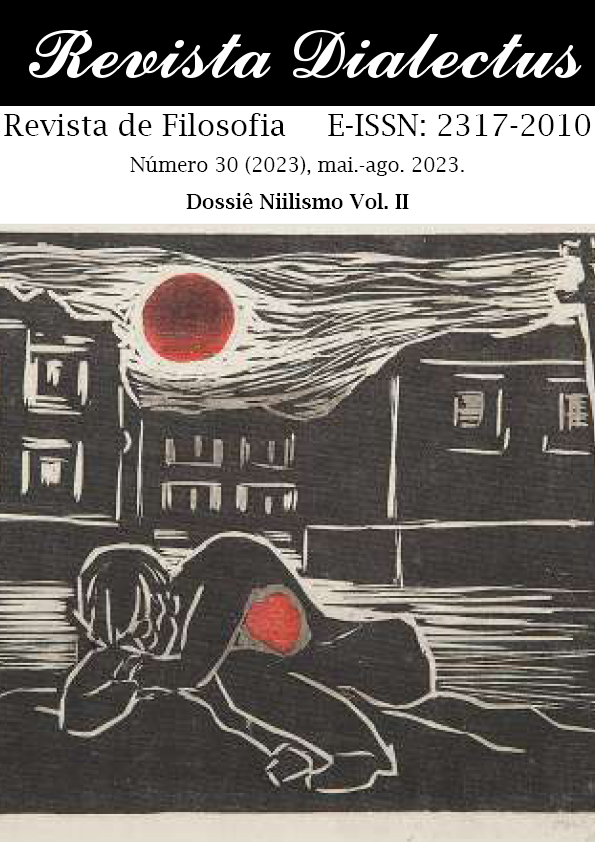L'HUMANISME DU CRI : DE L'ABSENCE DE L'HUMAIN À L'HUMAIN ABSENT DANS LE MALHEUR ET LE NIHILISME
DOI:
https://doi.org/10.30611/2023n30id92049Keywords:
Rupture, Sens, Humanisme, Nihilisme, MalheurAbstract
La réflexion sur le nihilisme, dans l'œuvre de Maurice Blanchot, est fondamentalement liée à la pensée de la rupture. Ainsi, si le nihilisme se configure comme la rupture avec le sens absolu, métaphysique et humain, la fin devient l'horizon de la transcendance pour l'humain avec la mort de Dieu. En ce sens, pour Blanchot, la transcendance, à partir du concept de Surhomme, s'inscrirait toujours dans une certaine dimension de l'humanisme, même si l'œuvre de Nietzsche se détache de l'idéal humaniste. C'est pourquoi Blanchot se consacre à réfléchir, à partir des notions de nihilisme, de l'humain inséré dans le champ de connaissance des Sciences Humaines, de la rupture du sens comme expérience du langage littéraire et du malheur dans les camps de concentration, à la possibilité d'un autre humanisme chez Nietzsche. Partant de cette hypothèse, cet article articule ces notions afin de penser la rupture comme une condition éthique qui se réalise à travers le langage comme seul moyen d'approximation, de distanciation, de fragmentation et d'itérabilité infinie.
References
BLANCHOT, M. La part du feu. Paris: Gallimard, 1949.
____. L’entretien infini. Paris : Gallimard [en ligne], 1969 [réf. du 08 septembre2022]. Disponible sur : http://palimpsestes.fr/textes_divers/b/blanchot/Entretien-infini.pdf.
DERRIDA, J. Points de suspension. Paris : Galilée, 1992.
FOUCAULT, M. Dits et écrits. Paris : Gallimard, 1994.
____. Les mots et les choses. Paris : Gallimard, 2013.
HEIDEGGER, M. Être et Temps. Traduction par François Vezin. Paris: Gallimard, 1986.
LEVINAS, E. De l'existence à l'existant. Paris: Vrin, 1947.
NIETZSCHE, F. W. La volonté de puissance. Traduction par Geneviève Bianquis. Paris : Gallimard, 1995.
____. Le Gai Savoir. Traduction par Henri Albert. Canada : Les Échos du Maquis, 2011.
WEIL, Simone. La personne et le sacré: collectivité, personne, impersonnel, droit, justice. Paris : Éditions Allia, 2018.
Downloads
Published
Issue
Section
License
Authors who publish in this journal agree to the following terms:
- Authors retain the copyright and grant the journal the right of first publication, with the work simultaneously licensed under the Attribution-NonCommercial-NoDerivatives 4.0 International (CC BY-NC-ND 4.0) License, which allows the non-commercial sharing of work, without modifications and with acknowledgment of authorship and initial publication in this journal.
- Authors are authorized to take additional contracts separately, for non-exclusive distribution of the version of the work published in this journal (eg publish in institutional repository or as a book chapter), with acknowledgment of authorship and initial publication in this journal.
- Authors are allowed and encouraged to publish and distribute their work online (eg in institutional repositories or on their personal page) at any point before or during the editorial process, as this can generate productive changes as well as increase the impact and citation of published work (See The Free Access Effect).



















